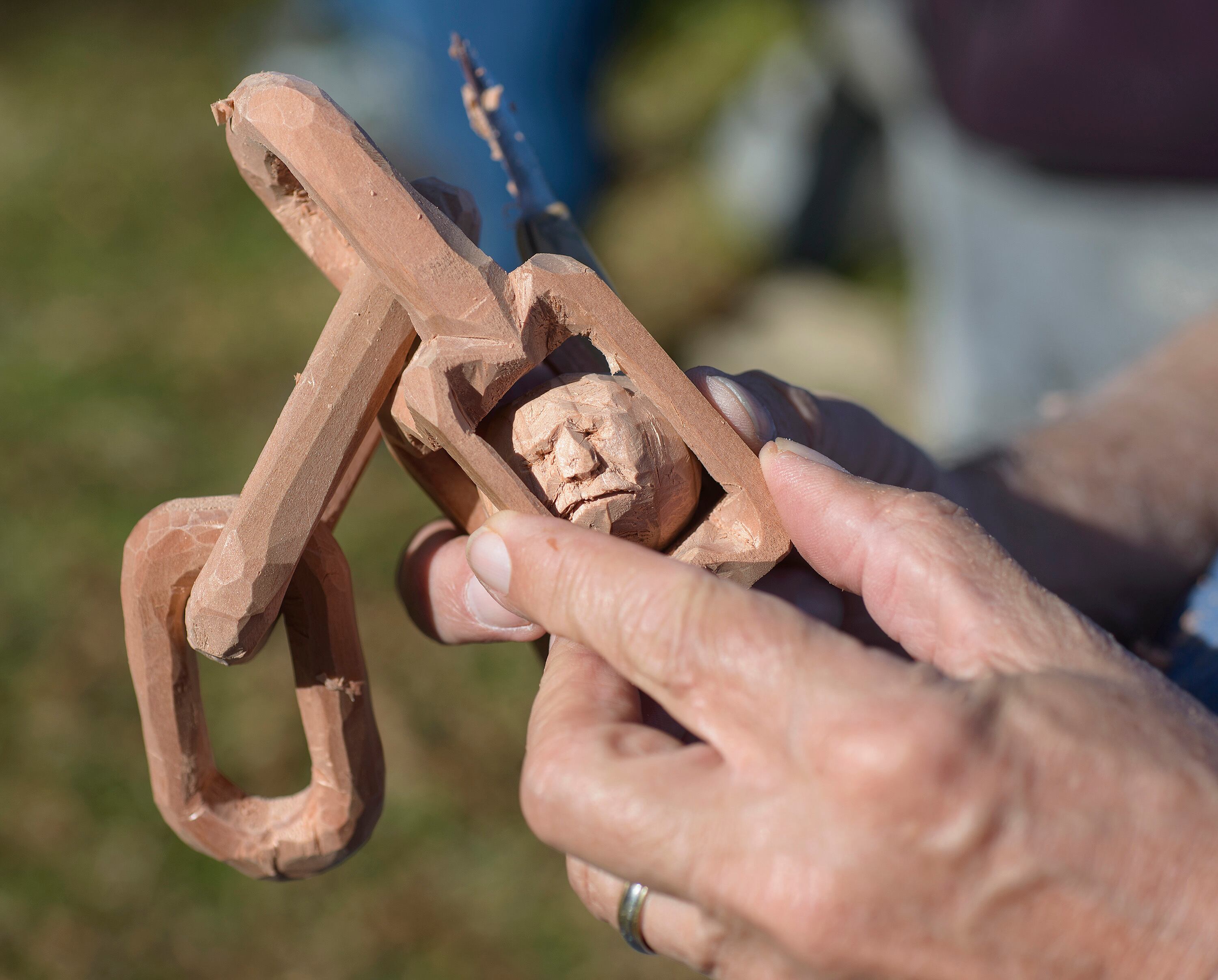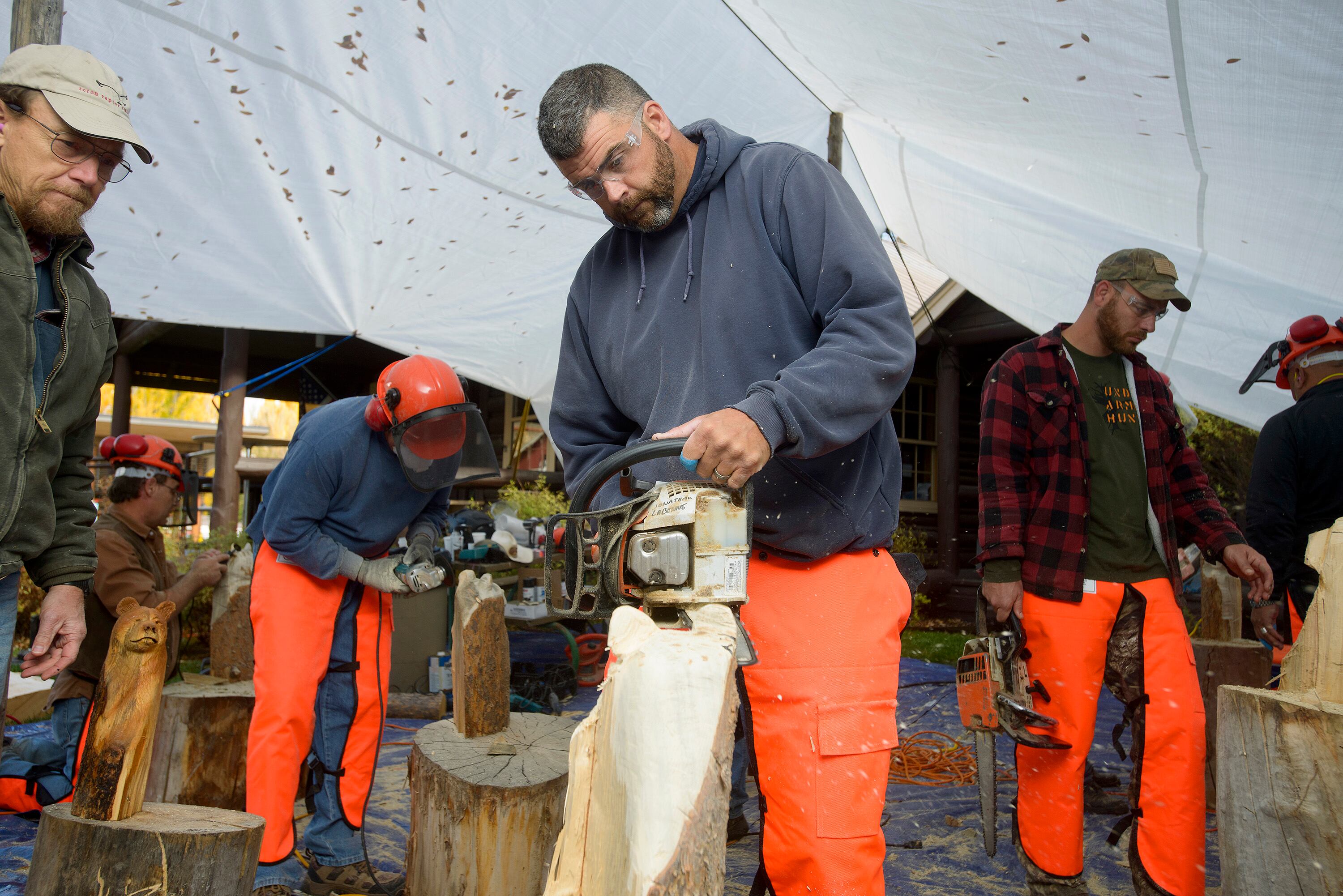JACKSON, Wyo. (AP) — Sitting on the bank of the Snake River, whittling a linked chain from a piece of redwood, former Air Force Master Sgt. Gary Shoemaker lost track of time.
The Boise, Idaho, resident laughed with other veterans of Operation Iraqi Freedom, told stories and enjoyed the tranquil scene at A.J. DeRosa's tipi camp. The men traded good-natured barbs about their particular military branches, shared tales of illness and treatment, and focused on their hobby.
Shoemaker's mental state was far different from the anxious, depressed, angry and even occasionally violent moods he has suffered since returning from war, he said. He remembered how, on the way home from a tour in Iraq, he tried to explain post-traumatic stress disorder to an airline employee who couldn't figure out how to get his band of brothers on the right plane.
"Listen, lady," Shoemaker, 38, said he told her about the ordeal they had been through and the PTSD they were suffering, "take your worst day you've ever had and multiply that by eight months."
Shoemaker was one of six military veterans hosted for a week by 21st Century Heroes, a nonprofit that aims to support veterans' mental health by teaching them new skills. The group was begun by Sandra Budak of Honoring Our Veterans, and it was so popular that it was adopted and supported by an anonymous benefactor, a second homeowner in Jackson Hole who served in the military.
The October gathering was the fifth session and featured instruction by three professional wood carvers, two from the Teton area and one from Chicago.
The works the veterans create could be trinkets they give their families, or they could end up for sale in art galleries, said Christine Tatosian, executive director of 21st Century Heroes.
"They create something out of nothing," Tatosian said. "It's incredibly satisfying, incredibly healing. It gives them a purpose and a focus."
Part of the nonprofit's gift to the men — in addition to a week's lodging, meals, professional instruction and camaraderie — is a toolbox of implements to continue their craft.
"When they go home, the therapy doesn't stop," Tatosian said.
His lap covered in wood chips, former Army Sgt. Ray King said just traveling to Jackson from his hometown of Murrayville, Illinois, was stressful.
"We get to the point where we're comfortable in our own surroundings," King said. "Once we get our regime messed up, that's when we flip out."

A camp participant carves a piece of wood into interlocking chain links.
Photo Credit: Price Chambers/Jackson Hole News & Guide/AP
Tatosian helped coordinate with Transportation Security Administration agents at various airports to escort the men through.
King is a second-generation soldier. His father fought in the Korean War but was tight-lipped about his experiences there. After King returned from the Middle East he drove to his father's house to see him. For two hours the men sat in silence, eyeing each other and collecting their thoughts.
"Finally I asked, 'How do you deal with it?'" King said.
His father replied, "Day by day."
PTSD is the elephant in the room for many war veterans, King said. As he spoke he used a palm gouge to work on his project, occasionally gouging his fingers and jumping up to rinse his wound and wrap it in tape.
"Unless you've lived it, people don't understand it," King said of the illness that keeps a soldier's physiology in fight-or-flight mode indefinitely.
"Most guys wouldn't talk about PTSD unless their wives didn't say, 'I want a divorce,'" King said. "That wakes you up a little bit."
Shoemaker nodded. "Our wives are saints," he said, "truly amazing people, putting up with us."
In addition to mental illness, many of the veterans suffer physical ailments.
Retired Air Force Sgt. Tim Wymore worked in the burn pits in Iraq, setting fire to thousands of items the military deemed unusable or that needed to be disposed of. Many of the things they burned likely gave off toxic gases and smoke.
Wymore takes "three pages" of pills each day, he said, for illnesses ranging from asthma and chronic fatigue syndrome to lesions on his brain and Burkitt's lymphoma. At one point, Wymore said, he weighed 300 pounds and was using a wheelchair, "swole up like a tick" from his various health problems. His wife "had to kick down some doors" at the Department of Veterans Affairs to get him the help he needed.
Social media and networking with other veterans helps his generation of returning soldiers cope, Wymore said, as well as privately offered programs like 21st Century Heroes.
"This is awesome," Wymore said, resting his knife on his leg as he gazed at the Teton range. "These people are top-notch."
Jackson carver and instructor Kevin Coughlan said he was impressed by how quickly this batch of pupils took to the lessons.
"They're eager to master it," Coughlan said. "The lesson today is try to work with the grain so you don't break the wood."
The youngest of the soldiers, 23-year-old Peter Arsenault of Edwardsville, Illinois, was quiet as he carved, his wrists decorated with bracelets bearing the names of men in his unit who had died in the war he fought.
After spending the night at a ranch in Moran that the owners had donated for the week, the men reconvened in the basement of American Legion Post 43 to carve a shorebird from a block of aspen. Their work was inspired by looking at a large sculpture that Tetonia, Idaho, instructor Dan Burgette had placed on the table as an example.
Instructor Joe Dillett of Chicago has been teaching veterans the skill of wood carving for decades, he said.
"It's a blessing," Dillett said, carving a spirit face into a piece of cottonwood bark encrusted with lichen. "I feel like I'm serving my country by serving them."
His wife, Sharon, stood by all week with a first-aid kit for the inevitable nicks and scrapes that come from working with hand tools.
Retired Army Sgt. James Riden, 45, was back in Jackson for his fourth session with 21st Century Heroes, serving as a mentor to other men and polishing up his skills.
"After Kevin and Joe and them threw splinters into me, I couldn't get them out," Riden said. "It's very relaxing. Instead of thinking about negative things I'm thinking about positive things."
The meditative nature of carving has helped Shoemaker with his recovery, he said. During his first woodcarving session in May he had a breakthrough on the fifth day of the camp.
"That day was the first time in six years I hadn't had to take anxiety medication," Shoemaker said. "It's helped me with my anxiety big time. I didn't even realize I didn't need it. Hopefully some of these guys will be able to experience the same thing."

Former Army Sgt. Ray King, an Iraq War veteran, joins other servicemen at the American Legion Post 43 for part of the camp.
Photo Credit: Price Chambers/Jackson Hole News & Guide/AP





